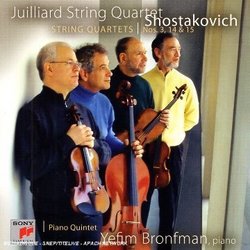Amazon.comShostakovich must be one of the most written-about composers. His works have been analyzed for their musical content, their political subtext, and their relationship to his personal and public life, ignoring the fact that music follows its own laws. However, they have now become familiar enough to render further words unnecessary; just listening to them tells us all we need to know. For example, the assertion that the 15 quartets sound much alike is easily disproved by this recording, with which the Juilliard String Quartet is celebrating the composer's 100th birthday as well as its own 60th anniversary. These three quartets differ greatly in length, structure and feeling, though they share Shostakovich's characteristic mood-swings and frequent reversal of instrumental registers. No. 3 Op. 73 (1946) begins cheerfully only to become spooky, ferocious, and mournful, until the sparse, timorous Finale brings back the opening theme like a wistful dream. No. 14 Op. 142 (1973), dedicated to the cellist of Shostakovich's champions, the Beethoven Quartet, has a prominent cello part bristling with stratospheric virtuoso cadenzas. By turns wild, sardonic, bleak, and lamentatious, it fades away in forlorn desolation. No. 15 Op. 144 (1974) has been called the composer's own requiem. Its six very slow, mournful movements include an Elegy and a Funeral March; played without pause, they are punctuated by violent slashing chords and feverish running passages; the end is a dying whisper. Yefim Bronfman joins the Quartet for the Piano Quintet Op. 57 (1940). Despite its intense, somber opening, diabolical Scherzo and solemn Fugue, it is primarily optimistic, ending with a confident smile. The Quartet has naturally undergone many personnel changes. Today, none of the original members are left, but its spirit of adventure, commitment to a wide-ranging repertoire, and musical integrity are fully intact. The players focus on character rather than purity and homogeneity of sound, but the violin tone has a singularly beguiling sweetness. They are at their best in the lyrical, expressive parts; the wild, unbridled ones seem too civilized. --Edith Eisler


 Track Listings (8) - Disc #1
Track Listings (8) - Disc #1